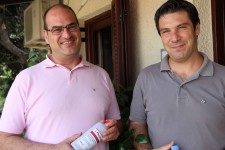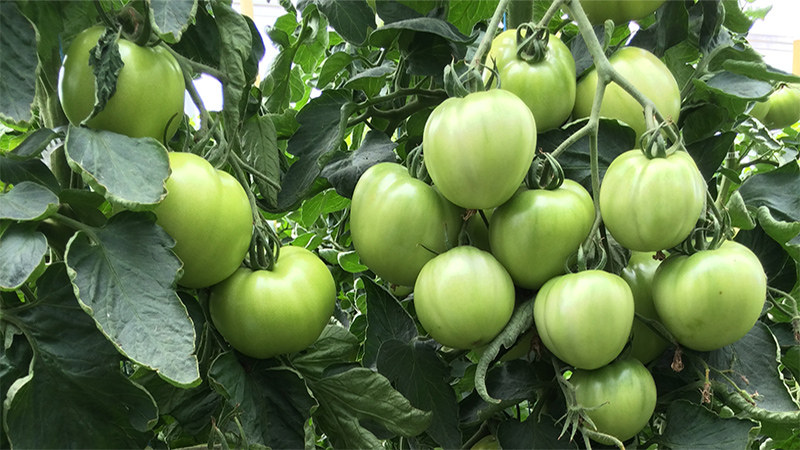With Ingenuity, Greeks Tap Their Agricultural Roots

Agriculture might not loom large in the collective mental picture of Greece – that of blue seas bordering whitewashed, blue-domed buildings clinging to the cliffs. But the sector has emerged as a rare bright spot in this quintessential Mediterranean paradise. Its growth is a stark contrast to the recession and political mayhem stealing the headlines, although these, too, are showing signs of easing.
“In Greece, agriculture is historically a very significant sector, along with crop protection. According to our belief and some recent studies, it could be one of the engines that would help Greece to grow and recover,” Yannis Diokarantos, head of DuPont Hellas and president of the Hellenic Crop Protection Association, said in an interview with Farm Chemicals International in Athens. Greece grows more than 60 crops, some of them subtropical.
Later that afternoon, Diokarantos was flying to the island of Crete, a greenhouse and olive growing powerhouse, for a conference on the white fly, which is a serious pest of the tomato in the region. DuPont is preparing the launch of its new insecticide called cyazyapyr, to be registered in Greece in 2015. “All of the old pesticides have developed a resistance,” he explained.
As tourism picks up – it is expecting record visitors in 2013 – Greece is also pinning hopes on the continuing expansion of its ag industry. Agricultural exports jumped 14.3% with a value exceeding $2.1 billion in the first four months of 2013, according to the non-profit Foundation for Economic and Industrial Research (IOBE).
Unlike the bubble-and-bust situations in real estate and finance, agriculture’s growth kept a steady pace, contributing twice the Eurozone average from 2000 to 2010 by gross value, according to the IOBE. It is still growing.
Greece’s geographical position, with ports linking Europe and Asia, provides a huge advantage. Athens’ Port of Piraeus is now poised to become the No. 1 port in the Mediterranean, with the help of the Chinese. Cargo volume at Piraeus is three times what it was in 2010, when the Chinese shipping giant Cosco leased half the port in a $647 million deal. Captain Wei Jiafu, Cosco president, said in reports that it will handle 2.5 million containers in 2013 versus 2.1 million in 2012, and it plans to increase investments in the already expanding port.
“The Chinese are interested in other investments in Greece. New roads are being opened. We are committed to further developing and strengthening the relations between the two countries with greater involvement of China in the development of Greece,” Greek Prime Minister Antonis Samaras said in a June article in the Independent Balkan News Agency.
The country’s location next to Turkey is also critical: Turkey is the route through which many Chinese products enter the European market. Unfortunately, this includes counterfeit products, and they are finding their way into the value chain in increasing numbers, Diokarantos said. “It started a few years ago, when counterfeits were about 20% of the total. The main reason is the delay of registrations,” as cutbacks mean fewer employees are able to handle incoming registrations, he explained. Recent cases of crop damage due to illegal pesticides were relayed by Diokarantos as well as others interviewed.
“We try to create a network between Greece, Turkey, Bulgaria and Romania in order to manage and minimize this kind of development,” Diokarantos said. This includes holding regular meetings with customs officials, police, ministries and industry participants from each of these countries to discuss controlling the entrance of counterfeit goods.
Using Ingenuity to Adapt to Crisis
And what of the current state of the Greek economic crisis? Beyond DuPont’s offices, the din of music and chatter pours out of the throngs of packed cafes across Athens, from the upscale Plaka district to tourist-mobbed Syntagma Square to the bohemian Exarchia neighborhood. Apart from the extensive graffiti and occasional boarded-up storefront, there are few obvious signs of a crisis – that this is any different from every other European city, quaint and steeped in history.
Even as the country is dogged by its sixth straight year of recession, agriculture has been one of the few steady, underlying sources of strength in the economy, said Dr. Michalis Papaeconomou, managing director of Agrology, a crop protection manufacturer and distributor that is increasing its business in formulation technology for fertilizers in gel form. About a decade ago, he and his brother, who run the company together, decided the rigorous EU regulatory environment made pesticides as their sole trade too risky. So they diversified into new high-value areas of agriculture such as specialized nutrition, and started a solar energy venture called Advartia.
“Greece has changed so dramatically in the past few years,” he said in an interview with FCI at the company’s headquarters in Thessaloniki, a northern port city that serves as a major gateway for the Balkans and southeastern Europe. “From a tax point of view and business mentality, it’s unbelievable. This year agriculture is going well, and we are expecting a record year for tourism. People are focusing where value is and on how things should be done,” he said.
Papaeconomou expects generic pesticides to increase their share of the Greek market in the coming years, as data protection expires and companies start to export different actives and offer more choices.
From his sunlit office decorated with colorful photos of a vacation at Angkor Wat, Papaeconomou spoke of frustrations with making new hires – young people are not furthering their education despite the crisis, he complained – and at the same time praised Greeks’ aptitude for adapting to crisis. “If Europe goes further into a downturn, we are one of the first to have adapted to the new reality while others are still trying to figure out what is happening. We are very optimistic about things.”
Up until four or five years ago, the trend had been to leave the villages for the big cities, Papaeconomou explained, but he has noticed a new pattern. “[Young people] cannot get a job, life is expensive, and so they are going back to villages and staying at their parents’ house. That’s been an underlying, visible trend,” he said.
With a hint of frustration in his voice, he pointed out that Greek crops have the lowest residue levels of any EU country yet this is not widely publicized.
Agrology SA took in $11.1 million in sales in 2012, and Papaeconomou expects that figure to climb to $12 or $13 million this year. It is the sole Greek formulator of a fertilizer in gel form called Dyna-XGels, of which he said sales are “growing like crazy” with a 25% increase expected this year, on top of a 20% gain in 2012.
“We keep getting reports from all different countries that it outperforms regular NPKs. You need to be able to show more than a 10% increase in product performance; anything else the farmer won’t notice. That’s why we made the decision to go global,” he said. Agrology exports the product to a handful of countries, including Uzbekistan, Peru and Italy, and plans to bring it to more markets are in the works.
Tangible Solutions
One consequence of the crisis has been increasing fragmentation, and the industry was already fragmented to begin with, said Athanasios Raptis, marketing director of Elanco Hellas, the largest Greek-owned chemical firm. “There is a saying here,” he said. “There are 10 million people in Greece, and 10 million presidents.”
Indeed, more than 3,000 points of sale dot the country’s 50,960 square miles – Greece is roughly the size of Estonia, Denmark and Netherlands combined. The average farm size: just 4.7 hectares. Compare that with France’s average farm size of 55.7 hectares, or Germany’s 48.4 hectares. In total, about 724,000 agricultural holdings manage 3.41 million hectares of cultivated land, according to the Greek National Statistical Service.
Agriculture contributes about 5.2% to the Greek GDP, 22.9% to exports and employs nearly 13% of the workforce.
Raptis maintains that by increasing exports of high-quality products and managing tough European protocol head-on, Greece’s ag sector has been able to offset challenges posed by the struggling economy: “The crop protection market is in good shape. I’ve been working 24 years in this business…Our company is increasing business day by day.” Elanco recorded about $20 million in crop protection sales last year, fifth behind BASF, Syngenta, Bayer and DuPont.
However, Alexis Katsivas, Monsanto’s director for Greece and Cyprus, said Greece’s credit issues have – at least temporarily – caused growers problems in obtaining financing for inputs. Durum wheat plantings have soared for this reason, as it is a low-input crop. Fertilizer use is down in recent years. “Farmers are losing some opportunities, but the picture is still positive,” Katsivas said in an interview at Monsanto’s Athens office. “On the plus side, top Greek banks were just upgraded [by Fitch Ratings]. After recapitalization, credit will be improved and there will be more space to maneuver in the business.”
“We are trying to support the country with tangible solutions: We try to improve yields and reduce inputs,” Katsivas said. “This crisis is an alarm for everybody. You have to be more efficient.” Monsanto has launched a campaign to help Greek growers save money, cut residue levels and reduce drift by educating them on using Roundup according to the label, lowering spray volumes and employing other techniques, such as planting twin-row plots of corn.
Katsivas pointed out that people are more eager now to listen to and take advantage of new ideas and proposals. But he is not so sure that the trend of Greeks returning to rural life will prove fruitful: “There are new people with fresh ideas, but it is clearly not going to be easy to condition them to become farmers.”
Biocontrols Pick Up
The use of beneficial insects and bees is making headway here, championed by niche enterprises like Anthesis, the top Greek distributor of these products. Founded in 2007, Anthesis is Greece’s exclusive distributor of Syngenta’s Bioline, a product line of beneficial insects and mites to control pests in fruits, vegetables and ornamentals.
The youthful duo who head up Anthesis, Georgios Komianos, director, and Spiros Kavouras, sales manager, expect the company will grow as much as 20% a year for the next 10 years.
About 17% of the business is in bees, which pollinate indoor crops such as tomatoes, and are considered the first step towards Integrated Pest Management. Other beneficial insects and mites are used to control pests on currently about 10% of tomatoes, cucumbers, peppers, strawberries and other vegetables in Greece’s 4,500 hectares of greenhouse area – about half of which is in Crete – and Komianos said this is set to expand. Beneficial insects are not used outdoors, although there are experiments with beneficial mites to control spider mites.
“Chemical companies are realizing that our products complement theirs, so we make a program that reduces the risk of the resistance of the target pest,” Komianos explained. The biggest hurdle, he said, is a common one: the lingering belief that beneficial insects are not as effective as conventional products. But there is also a lack of professional support and consulting at the farmer level. Unregistered products that fail to deliver on their promises end up hurting legitimate businesses. In cases like these, Komianos admitted, “trust is missing between us and the farmer.”
Semiochemicals – what Kavouras called a “mate-disruption pheromone” – is another product category gaining traction as a new method here to control Lepidoptera on peaches, apples and grapes.
By contrast, biopesticides are a newer business to Greece – not more than six years old – and are seldom registered, so they are mainly sold as fertilizers, said Komianos, who estimates they make up 5% to 10% of the total pesticide market. Confusing legal frameworks and high registration fees have made them slow to grow beyond the scope of Bt products and pyrethrum, he said. But the potential still exists.
“The outlook for biopesticides is positive. But we don’t know the rhythm of development; we don’t know how fast it will grow. The biggest motivation is the export market demand for clean products, and then the other motivation is that there are bans of many traditional chemicals,” Kavouras said.
Komianos echoed the upbeat sentiment: “Maybe there is competition with chemicals here, but at same time there is a friendly approach. Our clients see the positive aspect of our products, and we see need for chemicals to lower the risk for the farmer.”






